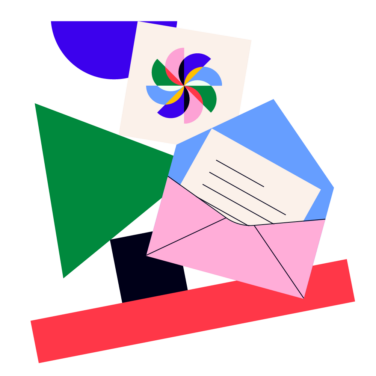Artificial intelligence, or AI, has become a trending topic amongst many in the business world since late 2022. While the technology had certainly existed beforehand, it was with the launch of ChatGPT on November 30 that marketers really began to take note. After all, the artificial intelligence chatbot surpassed 1 million users in its first five days, and now has over 100 million users with openai.com receiving approximately 1 billion visits per month.
Finding itself so quickly adopted by our tech-curious world, even top marketers were left with a number of questions to solve—and fast—or risk getting left behind. In what ways could they utilize it? How could they detect it, or protect their companies from poor use? Was it really going to be the biggest marketing trend in 2023? And in which areas of business could it have the most impact?
To begin a conversation and open dialogue on all these thoughts, we interviewed 20 CMOs and marketing executives on the top 5 new marketing trends leaders need to know, and surprise surprise, 13 of them mentioned artificial intelligence almost instantly.
In this article, I’ve combed through our interviews to pull out the most common themes and answer how today’s top CMOs are leveraging AI in marketing. Whether it’s to create content (and careful here, you’ll still want to read the section on that), make better decisions or simply free up valuable time from tedious tasks, read on for what our community of CMOs had to say.
1. Content Creation
The most common theme amongst how marketers were leveraging AI, was that they were using it to produce their content. A task that’s reported to take B2B content marketers an average of 33 hours (or around 82% of their work hours) each week, you can imagine the opportunity here to improve on efficiency, or to scale output without adding additional resources like team members, budget, or time.
But it’s incredibly important to note that ChatGPT is still in its infancy, and cannot replace the skill, personality, and brand understanding of an actual, human editor. It was on this precise point that our interviewed CMOs urged caution, pointing out that potential customers still very much prefer for a company to not only inform or educate (which can be done through AI), but to do so with personality through a distinct brand voice (which is much, much harder for it to do).
In fact, according to the Sprout Social Index, consumers surveyed had reasons why some brands stood out more than others, with forty percent saying memorable content, 33% saying distinct personality and 32% saying compelling storytelling. While ChatGPT can certainly aid you in this effort, it simply cannot (at this stage at least) compete with humans on all three.
For some companies, there are also concerns on the impact that ChatGPT will have on search engine optimization and content marketing for SERPs. While we have yet to see the results on this, Forbes states that AI can certainly help to automate and improve tasks like keyword research and content optimization, “including understanding the semantic relationships between keywords, identifying search trends and predicting user behavior.” That said, we highly recommend that at this stage you do not use it to write content in its entirety.
2. Amplifying The Human Touch
Jason Tsai, CMO at Captify, speaks some wise words in the quote above. As an ongoing point from the last section, your customers will be able to tell the difference between content generated or experiences created by AI over humans, and they simply don’t want to talk to (let alone be influenced by) robots. Regardless of the industry amongst our CMOs—it could be SaaS, finance, or even insurance–there was always one resounding theme:
So it isn’t to say that artificial intelligence has no place within marketing. In fact, it’s very much the opposite. The difference is that AI should not be the prevailing creator of your content, campaigns, or strategies, but rather a tool in implementing the smaller steps within it. Use AI to perform keyword research, help with content ideation, summarize market research or write simple product descriptions for your web store. But leave the branding, article writing, and personalization efforts to humans—who know other humans best.
3. Freeing Up Valuable Time
When not being used specifically for content writing, the power AI yields to free up much of the modern marketer’s time is massive. Imagine less time spent on tedious tasks like brainstorming, outlining, and researching and more time spent where it really counts—like in personalizing content and experiences, actively engaging with customers to build relationships, and responding to customer queries even faster.
With fully engaged customers bringing in 51% higher revenue and sales than actively disengaged customers, this opportunity is not to be underestimated. The same study also found that they spend over 23% more, on average.
Much in the same way that we turn to certain marketing tools like marketing automation software or social media management software, AI platforms like ChatGPT will simply become another tool at a marketer’s disposal. Of course, as with any, this still requires training and a learning curve for best use cases and best practices, but it’s worth investing the time so that you don’t fall behind.
Because we know that when an opportunity such as this comes around, competitors will be clamoring to use it to their advantage. According to ZoomInfo, 83% of businesses say AI is a strategic priority for their businesses today, and with over 1 billion users now actively testing the tool, you’d better believe your competitors are sharpening their edge.
And while the worry of competitors gaining market share through innovative use of AI is very real, the worry that AI itself will take over marketing jobs is not of concern for our CMOs. At least, not yet. While I’ve seen many mentions of this fear on professional platforms from LinkedIn to Reddit forums—and Neil Patel found that 55.5% of people believe AI will replace human marketers in the near future—our top CMOs don’t see this happening any time soon.
Again, they point to seeing ChatGPT and AI platforms as a useful tool to be embraced, and not feared by today’s marketers. Yes, it’s important to manage it effectively and to stay ahead of competitors, but humans are still an essential ingredient in any marketing strategy, as only humans are capable of the creativity necessary to have a truly unique campaign.
4. Making Impactful Decisions
The last and final way that many of the CMOs interviewed discussed utilizing AI to their advantage was to use it in making decisions. This may not come as obvious as content creation or reduction of inefficiencies, but it certainly is interesting. Daniel Klein, CEO and Founder of Joseph Studios, introduces the idea as a way to remove bias:
And he has a point. Because while the pitfall of robots is the uncapped creativity that humans are capable of, their strength is to think logically, not emotionally, and therefore make totally unbiased decisions. Could there be a perfect world where humans and AI work in tandem to produce optimal results? Ben LeDonni, Founder of two digital organizations, Creative Multimedia Solutions and Deploymint, is looking into it.
Looking To The Future
Considering how quickly artificial intelligence and ChatGPT has already been adopted by marketers and businesses worldwide, one can only assume that it will continue to evolve quickly. While there’s no saying with 100% certainty where we will end up, our top CMOs are likely to have a good eye. After all, they’ve seen all kinds of trends and innovation within the span of their careers, and have found either found ways to make it work for them or ways to move on without wasting critical time and money.
So while I hope that you found this article useful in the different ways you can use AI to your advantage, it’s important to stay on top of it as things evolve in the future. There will inevitably be more uses, more similar tools emerging, and more ways that you can ‘trip up’ your brand by using AI in the wrong way.
In reality, AI is just another digital marketing platform that can help us do our jobs, and do them faster. So stay open to trying new things and experimenting with AI in various tactics, but be ready to adjust your strategy if something doesn’t work. This is new territory for us all, so we’d love to hear how you’re using AI in your business.
What lessons have you learned, tricks you’ve adopted to save time, or questions do you have about what’s next? Let us know in the comments, and be sure to subscribe to The CMO newsletter for more future content.
















